| June 2, 2010 CHICAGO (JGLi) – United States Sen. Richard Burr (Rep.-NC) is again playing Scrooge against the Filipino veterans even if they are “dying by the dozens each day. … They do not have too many months left in their lives.”
Burr, a ranking member of the U.S. Senate Veterans’ Affairs Committee, took the Senate floor Thursday (May 27), to oppose the plan of U.S. Secretary of Veterans Affairs Eric Ken Shinseki to transfer $67-million out of the $103- million saved from “construction projects for medical facilities and maintenance of VA facilities” to the Filipino Equity Fund. |
|
 U.S. Sen. Richard Burr, Republican from North Carolina |
 U.S. Senator Daniel Inouye, Democrat from Hawaii |
| The junior senator led the opposition to the $198-M Filipino Veterans Equity fund two years ago before it was lumped into the American Recovery and Reinvestment Act of 2009 that was signed by President Obama last year.
During the hearing of the Emergency Supplemental Appropriations For Fiscal Year 2010, Mr. Burr suggested an amendment to it that instead of shifting the $67-million to the Filipino Equity Fund which already used up $188-million of the available $198-million, it should instead go the Patient Protection and Affordable Care Act (H.R.3590), costing about $4-billion over 10 years, that would give financial stipend to a family member, who would take care a (military) service member “that is no different than we would have paid some stranger off the street.” Burr said the committee remains concerned that the Department (USVA) has a “significant problem with unfunded liability on its existing major construction projects. In fiscal year 2010 [this one] the Department will have 21 partially funded projects with a cumulative future cost of nearly $4.5 billion.” He again recalled his standard line of attack against the “special pension fund for Filipino veterans” two years ago: “First, it was not the right priority given the other needs that existed in our veteran community;” “Second, I don’t think it is appropriate to pay a benefit that is not adjusted for the different standards of living that exist between the Philippines and the United States. And “Finally, I don’t think these benefits were ever promised in the first place.” Coming to the defense of the Filipino veterans, Sen. Daniel K. Inouye (Dem.- HI), U.S. Senate Appropriations Chairman, said, “I think it is well that we review a bit of the history of World War II. On July 26, 1941, the President of the United States, Franklin Delano Roosevelt, invited the Filipinos, issued a military order, and said: ‘Join our forces in the Far East. If you do, at the end of the war, you will be entitled to, well, apply for citizenship and receive all the benefits of a veteran of the United States. That was a promise made by the President of the United States in March of 1942.’ “After going through the horror of Bataan and Corregidor, the Congress of the United States passed a law doing exactly that: authorizing Filipinos who wished to be naturalized to do so; and upon naturalization, a receipt of citizenship, they were entitled to all the benefits. “Madame President (Senator Jeanne Shaheen (D-NH), 470,000 volunteered, and many died as we know. Most of the men who marched in the Bataan Death March were not Americans; they were Filipinos. But then, when the war ended, we did send one member of the Immigration and Naturalization Service to Manila to take applications for citizenship. Before he settled down, he was recalled back to Washington. The Congress of the United States, in March of 1946, repealed that law, denying the Filipinos and reneging on the promise we made. “When I took the oath as a soldier in World War II, after the oath, the company commander told me there are three words that are precious: “duty,’’ “honor,’’ and “country.’’ Duty to your country, never dishonor the country. Show your love for your country. “Well, in this case, it should be apparent to all of us what we did was not right. We made a promise. We were honor bound to those men who served and got wounded. The emergency is very simple: they are dying by the dozens each day. They are old men. Their average age is 87. They do not have too many months left in their lives. That is why, it is in this supplemental bill. If we wait another year, who knows how many will be left? “I just wanted the record to be clear this is a matter of honor. We should uphold our promises. We are complaining to other countries when they violate a little portion of a treaty. This was a promise made by Congress and the President of the United States, and we reneged soon after the war. It is so obvious. Would we have done that to other countries? “Madam President, I am glad it is not coming up for a vote because I think it would be a sad day if we voted it down.” (lariosa_jos@sbcglobal.net) |
|
FILAM
U.S. Sen. Burr opposes $67-M Supplemental Filipino Equity Fund
Archives
- April 2019 (3)
- January 2016 (13)
- December 2015 (13)
- October 2015 (14)
- September 2015 (16)
- August 2015 (15)
- July 2015 (15)
- June 2015 (1)
- May 2015 (15)
- April 2015 (15)
- March 2015 (28)
- February 2015 (1)
- January 2015 (31)
- December 2014 (16)
- November 2014 (16)
- October 2014 (31)
- September 2014 (31)
- August 2014 (36)
- July 2014 (32)
- June 2014 (29)
- May 2014 (28)
- April 2014 (15)
- March 2014 (51)
- February 2014 (30)
- January 2014 (33)
- December 2013 (31)
- November 2013 (31)
- October 2013 (32)
- September 2013 (31)
- August 2013 (30)
- July 2013 (18)
- June 2013 (33)
- May 2013 (33)
- April 2013 (38)
- March 2013 (36)
- February 2013 (35)
- January 2013 (35)
- December 2012 (47)
- November 2012 (36)
- October 2012 (48)
- September 2012 (28)
- August 2012 (38)
- July 2012 (30)
- June 2012 (30)
- May 2012 (31)
- April 2012 (29)
- March 2012 (30)
- February 2012 (30)
- January 2012 (37)
- December 2011 (48)
- November 2011 (23)
- October 2011 (69)
- September 2011 (46)
- August 2011 (30)
- July 2011 (79)
- June 2011 (30)
- May 2011 (66)
- April 2011 (66)
- March 2011 (39)
- February 2011 (67)
- January 2011 (146)
- December 2010 (124)
- November 2010 (122)
- October 2010 (163)
- September 2010 (98)
- August 2010 (101)
- July 2010 (146)
- June 2010 (72)



 ShareThis
ShareThis